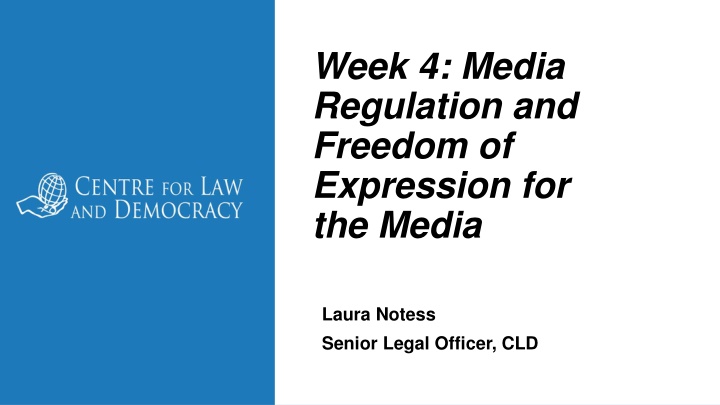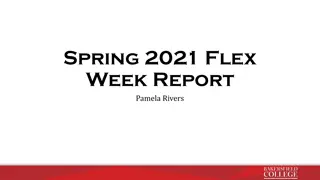
Media Regulation Principles and Practices
Explore the principles and practices of media regulation, including topics such as freedom of expression, journalistic independence, licensing, and self-regulatory systems. Learn about the importance of preserving editorial independence, promoting media diversity, and protecting confidential sources in the media landscape.
Uploaded on | 3 Views
Download Presentation

Please find below an Image/Link to download the presentation.
The content on the website is provided AS IS for your information and personal use only. It may not be sold, licensed, or shared on other websites without obtaining consent from the author. If you encounter any issues during the download, it is possible that the publisher has removed the file from their server.
You are allowed to download the files provided on this website for personal or commercial use, subject to the condition that they are used lawfully. All files are the property of their respective owners.
The content on the website is provided AS IS for your information and personal use only. It may not be sold, licensed, or shared on other websites without obtaining consent from the author.
E N D
Presentation Transcript
Week 4: Media Regulation and Freedom of Expression for the Media Laura Notess Senior Legal Officer, CLD
Review of Basic Principles; Journalists and Print Media Part II
Review from Last Week Basic principles: Independent and transparent regulatory regimes and bodies Preserving editorial independence and avoiding censorship Promoting media diversity
Review from Last Week Different principles apply for any regulation of each category: Journalists Print media Broadcasters Public service media
Journalists Licensing or registration of individual journalists is not appropriate Accreditation schemes may be appropriate in some contexts (such as parliaments) to ensure press coverage where public access is limited Protections for confidential sources are crucial
Regulating Print Media Licensing requirements are not valid under international human rights law Registration requirements are permissible, but special registration regimes are prone to abuse and not necessary. Any technical registration requirements (like registration fees) should not be overly burdensome
Self-Regulatory versus Co- Regulatory Systems Review: Self-regulation: system is entirely created and run by the media Co-regulation: system is backstopped by a legal rule but has significant media involvement in running or overseeing it Statutory: legislative body in which media does not play a significant role For the press: Self-regulatory systems preferred; co-regulatory may be accepted if crafted in a manner that preserves media independence
Self-Regulatory versus Co- Regulatory Systems There are a number of benefits to these types of systems: For the media, they tend to route complaints away from the courts, where they are expensive, time consuming and potentially involve harsh sanctions They also often set clear and appropriate professional standards, clarifying often complex issues For citizens, they provide an accessible system of redress (unlike the courts which are too expensive for most) For society as a whole, they can often be effective ways to improve overall professionalism in the media
Self-Regulatory versus Co- Regulatory Systems Self-regulation has a number of benefits: It is normally strongly protected against political interference It will normally be sensitive to the needs and pressures of working media At the same time: Due to its entirely voluntary nature, it can fail to be effective in promoting professional standards and may fail to attract public trust It can be difficult to set up outside of very mature media markets
Self-Regulatory versus Co- Regulatory Systems Co-regulation has some advantages: Since it has a legal backstop, it has more power to enforce professional standards It can be a lot easier to establish But much depends on the legislation: Co-regulatory systems can be independent, but there is a risk of government capture If media does not play a significant role, the system may not be sensitive to the needs of the media In some cases, the law provides for excessive sanctions International standards prefer self-regulation but don t necessarily exclude co-regulation
Journalist Safety This is a slightly different issue than the media regulation issues discussed during this week But it is important to ensuring journalists can work independently and produce content on controversial or sensitive issues If journalists face threats when reporting on certain content, the public is less likely to get information on these subjects The journalist s own right to life and other fundamental rights are also at stake
Journalist Safety States should ensure State actors avoid causing harm to journalists This obviously includes any illegal actions, such as attacking journalists in retaliation for their journalistic work It may also include other steps, like training police on the role of journalists who are reporting on protests, or developing codes of conduct for public officials that discourage using negative language about journalists
Journalist Safety Journalists may face threats from non-State actors, like organised crime or armed groups International human rights law governs State actions and States aren t directly responsible for the acts of others But they should take steps to protect journalists, and prosecute and seek redress when a journalist is harmed For example, ensuring law enforcement provides support when a journalist is threatened and promptly investigates crimes against journalists Depending on the circumstances, this could mean developing specialised journalist safety mechanisms
Broadcast Regulation
Regulating Broadcasting Broadcasting licensing is permissible and a well-established practice because (historically) it was necessary to ensure a diversity of voices on limited airwaves Only a limited number of available TV and radio stations Important to have an independent licensing authority and an open and transparent license allocation process
Broadcasting Authority Independence is key How can a body established by a government be independent ? Recall the factors that can ensure independence, such as: Mandate to act independently; clear powers Protection for its budget Appointment process for its leaders insulated from political interference Tenure protection Other steps to safeguard independence
Broadcast Licensing Licensing process should meet a number of requirements, such as: Clear criteria for awarding licenses Not based solely on the highest bidder No excessive fees or requirements that could harm diversity Clear procedure, including precise deadlines Rules around withdrawal of licenses must protect against political retaliation Special license categories for community/non-profit broadcasters
Broadcast Content Positive requirements imposed on broadcasters (requirements to carry certain kinds of content) Example: local content requirements Can be legitimate if they serve the public interest, promote media diversity But requirements that would interfere with media independence, like requirements to carry certain political messages, would not be legitimate
Broadcast Codes of Conduct Address similar issues to other press codes of conduct But they can be enforced by the regulatory body and can be linked to the license (for example if a broadcaster can lose its license for violating the code) This poses a risk of State interference with freedom of expression: This is why it is so important to have an independent regulator Sanctions for violating the code of conduct must comply with the three-part test
Review: The Three-Part Test Restrictions must: Be provided by law Protect a legitimate interest: respect of the rights or reputations of others, the protection of national security or public order or the protection of public health or morals Be necessary for the protection of that interest
Public Service Media
Public Service Media Public service media has a public interest mandate but is independent of government control Receives public funding This means less commercial pressures, which can make it harder to deliver public interest content Public service media is NOT the same as State media
Independence The board of public broadcasters should be protected against political interference Similar steps to guarantee independence as we have discussed earlier Also, best if the board cannot make editorial decisions to add additional protection for editorial independence
Funding States should fund public service media in a way that does not undermine independence This can be complicated Some countries fund public service media through special taxes or fees instead of through the government budget Public service media can be allowed to seek commercial advertising but safeguards should be in place to avoid commercial pressures compromising the public interest mandate
Mandate Public interest mandates may include a special focus on: Impartial reporting on news and current events Coverage of legislative or government proceedings Educational content Content covering diverse ethnic groups, in diverse languages or otherwise covering groups underserved by commercial media
Accountability Public service media is accountable to the public Transparency requirements, including annual reports and annual audits, are one way to promote accountability Public service media may adopt stricter codes of conduct given their mandate This may include public complaint options
Contact Information Centre for Law and Democracy: www.law-democracy.org Twitter: @Law_Democracy Laura Notess: laura@law-democracy.org






















